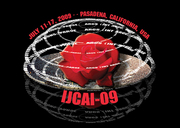 |
Logic and the Simulation of Interaction and Reasoning 2 (LSIR2)
Pasadena CA, United States of America; 12 July 2009
 |
In the past years, logicians have become more and more interested in the phenomenon of interaction. The area logic and games deals with the transition from the static logical paradigm of formal proof and derivation to the dynamic world of intelligent interaction and its logical models. The research training site GLoRiClass, the main financial sponsor of this workshop, is one of the examples of this type of research.
While these interactive aspects are relatively new to logicians, on a rather different level, modelling intelligent interaction has been an aspect of the practical work of computer game designers for a long time. Pragmatic questions such as 'What makes a storyline interesting', 'What makes an reaction natural', and 'What role do emotions play in game decisions' have been tackled by practicing programmers. The practical aspects of computer gaming reach out to a wide interdisciplinary field including psychology and cognitive science. So far, there are only a few cross-links between these two communities.
|
| The History: LSIR1. |
When the need for a venue to connect the research in logic and games with the more applied research on stories, games and simulation of behaviour was recognized, the research training site GLoRiClass decided to organize a workshop Logic and the Simulation of Interaction and Reasoning (LSIR1) at the AISB Convention in Aberdeen in April 2008. The general sentiment of participants of LSIR1 was that such a workshop should be repeated, possibly with more focus, enabling directed efforts for new research projects.
|
| Aims & Scope |
LSIR2 is the successor of the mentioned Aberdeen workshop and will be held at IJCAI 2009, concretely focussing on the relation between modern techniques in logic (such as discourse representation theory or dynamic epistemic logic) and concrete modelling problems in computer games (either as part of the story or game design or as part of the design of the artificial agents).
We aim combining communities of logic, multi-agent systems, computer game design, and the story understanding community. This aim will be reflected in the list of the four keynote speakers and should also be visible from the selected submissions.
|
| Invited Speakers. |
Leora Morgenstern (Hawthorne NY, United States of America): Revisiting Choice Points in a Branching-Time Temporal Structure: Ontological Foundations for Time Travel
Lenhart Schubert (Rochester NY, United States of America): From generic sentences to scripts
R. Michael Young (Raleigh NC, United States of America): The Representational Challenges of Fictional Worlds |
| Contributed Talks. |
Jan Broersen. A Preliminary Investigation into the Influence of Agent Types on Rational Agent Interactions
Sujata Ghosh. Strategies made explicit in Dynamic Game Logic (cancelled)
Nadine Guiraud, Andreas Herzig and Emiliano Lorini. Speech acts as announcements
Ethan Kennerly. Computing Quality of Life in a Social Management Game
Ethan Kennerly, Andreas Witzel and Jonathan Zvesper. Thief's Beliefs
Martin Magnusson, David Landén and Patrick Doherty. Logical Agents that Plan, Execute, and Monitor Communication
Amitabha Mukerjee. Discovering symbols from interactions - easier than explaining interactions via symbols?
Rafael Pérez y Pérez. Emotions in Plot Generation
Jos Uiterwijk and Kevin Moesker. Mathematical Modelling in TwixT |
| Preliminary Schedule. |
Click here. |
| Programme Committee. |
Jan Broersen (Utrecht, The Netherlands)
Cristiano Castelfranchi (Rome, Italy)
Frank Dignum (Utrecht, The Netherlands)
Anton Leuski (Marina del Rey CA, United States of America)
Benedikt Löwe (Amsterdam, The Netherlands)
Erik T. Mueller (Hawthorne NY, United States of America)
Amitabha Mukherjee (Kanpur, India)
Mark Overmars (Utrecht, The Netherlands)
Eric Pacuit (Stanford CA, United States of America)
Rohit Parikh (New York NY, United States of America)
David Traum (Marina del Rey CA, United States of America)
Jos Uiterwijk (Maastricht, The Netherlands)
Hans van Ditmarsch (Otago, New Zealand & Aberdeen, Scotland) |
| Calls. |
Call for Participation / First Announcement (27 November 2008)
1st Call for Papers (9 January 2009)
2nd Call for Papers (20 February 2009)
3rd Call for Papers (11 March 2009)
|
| Important Dates. |
3 April 2009. Submission Deadline.
17 April 2009. Notification.
8 May 2009. Final papers due.
12 May 2009. Workshop in Pasadena. |
|

|